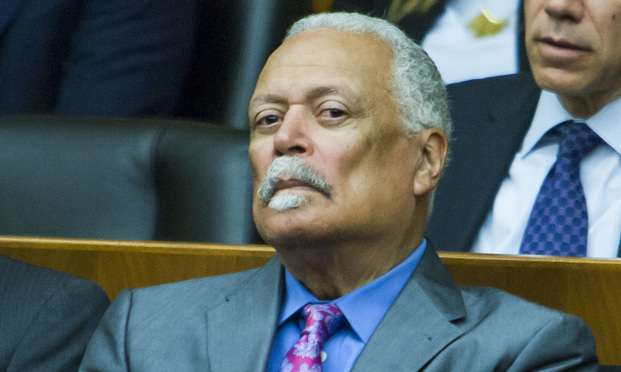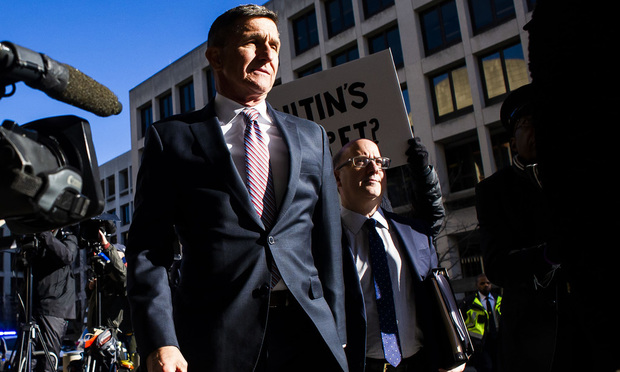Michael Flynn Should Be Sentenced for Lying to FBI, Court-Appointed Amicus Tells Judge
"The government has engaged in highly irregular conduct to benefit a political ally of the president," Debevoise's John Gleeson, serving as amicus counsel, said in a new filing in the prosecution of Michael Flynn in Washington. He called DOJ's move to drop the case a "gross abuse of prosecutorial power."
June 10, 2020 at 12:34 PM
7 minute read
 U.S. District Judge Emmet Sullivan of the District of Columbia during the court's Reentry Court Inauguration Ceremony. June 6, 2016. Photo: Diego M. Radzinschi/ ALM
U.S. District Judge Emmet Sullivan of the District of Columbia during the court's Reentry Court Inauguration Ceremony. June 6, 2016. Photo: Diego M. Radzinschi/ ALM
A former federal judge appointed to oppose the U.S. Justice Department's bid to drop the case against Michael Flynn said Wednesday the trial court should reject the move and instead proceed with sentencing the former Trump national security adviser, who has twice pleaded guilty to lying to the FBI.
John Gleeson, now a partner at Debevoise & Plimpton, was appointed last month to counter the Justice Department's extraordinary retreat from the prosecution and also address whether Flynn's judge should begin a perjury inquiry. Gleeson on Wednesday recommended against a stand-alone perjury investigation, instead advising the trial judge, U.S. District Judge Emmet Sullivan of the District of Columbia, to consider Flynn's statements at sentencing.
"The government has engaged in highly irregular conduct to benefit a political ally of the president. The facts of this case overcome the presumption of regularity," Gleeson wrote in his 82-page friend-of-the-court brief. "The court should therefore deny the government's motion to dismiss, adjudicate any remaining motions, and then sentence the defendant."
Gleeson called the Justice Department's move to abandon the case a "gross abuse of prosecutorial power."
Flynn had opposed the appointment of Gleeson to address the Justice Department's bid to dismiss the case. Flynn's lawyers, led by Sidney Powell, a former federal prosecutor, have asked the U.S. Court of Appeals for the D.C. Circuit to order Sullivan to dismiss the case, as the government has asked. The appeals court will hear argument Friday.
Flynn asserted months ago that he had not committed a crime, a retreat from his claim, under oath, that he had lied to the FBI about a conversation with the Russian ambassador to the United States in the buildup to Trump's inauguration. The Justice Department, under U.S. Attorney General William Barr, contends investigators lacked a valid basis to interrogate Flynn in the fateful January 2017 interview at the heart of his criminal prosecution. Former DOJ leaders dispute Barr's contention that there was no basis to question Flynn and that the then-national security adviser's false statements were not "material."
On the question of whether Flynn committed perjury, Gleeson said there was "irrefutable evidence" that the former national security adviser lied to the court in the course of his prosecution. Gleeson said Flynn "deserves punishment" for that offense, but he recommended that Sullivan take "Flynn's perjury into account in sentencing him on the offense to which he has already admitted guilt" rather than initiate a separate prosecution.
"This approach—rather than a separate prosecution for perjury or contempt—aligns with the court's intent to treat this case, and this defendant, in the same way it would any other," Gleeson argued.
At Friday's blockbuster hearing, the D.C. Circuit will hear extraordinary arguments over whether it should order Sullivan to dismiss the case or, perhaps, put that decision in the hands of another judge.
Sullivan turned to a prominent trial lawyer, Beth Wilkinson, to defend his refusal to immediately allow the Justice Department to abandon the prosecution. The D.C. Circuit case has raised broad questions about the judiciary's authority to review prosecutorial decisions, including the government's move to drop a case after a defendant has pleaded guilty.
 Retired Army Lt. Gen. Michael Flynn, center, arrives at federal court in Washington in 2018. Photo: Diego M. Radzinschi/ALM
Retired Army Lt. Gen. Michael Flynn, center, arrives at federal court in Washington in 2018. Photo: Diego M. Radzinschi/ALMJeffrey Wall, the top deputy to Solicitor General Noel Francisco, is set to argue for the Justice Department. In a brief leading up to the arguments, the Justice Department said it had based its decision to drop Flynn's case on the newfound belief that the FBI lacked a valid investigative purpose for conducting the January 2017 interview in which the then-national security adviser admittedly lied about his conversations with the Russian ambassador to the U.S.
The Justice Department, noting also its concerns about being able to prove Flynn deliberately lied in the interview, said Sullivan "has no authority to reject the executive's conclusion that those reasons justify a dismissal of the charges."
In picking Gleeson, Sullivan selected a kindred spirit of sorts. In his 22-year career as a federal trial judge in Brooklyn, Gleeson asserted control over a settlement the Justice Department reached with HSBC resolving money laundering allegations against the bank, even after prosecutors argued that his role was more limited.
Sullivan drew heavily from Gleeson's handling of that case when, a few years ago, he reviewed a similar settlement the Justice Department reached with a South Korean firm accused of paying bribes to win contracts from the U.S. Army. In that case, as he has done in Flynn's, Sullivan appointed an outside lawyer to weigh in on the scope of his authority to review the Justice Department's prosecutorial moves.
Sullivan's appointment of Gleeson has drawn considerable attention and kicked up a debate—in court briefs and newspaper op-ed pages—concerning his oversight of the case. Sullivan's supporters, including former Watergate prosecutors and two dozen retired federal judges, have defended his recent handling of the prosecution as a well-grounded exercise of the judiciary's authority as a co-equal branch of government.
His detractors have contended that Sullivan overstepped in drawing out the proceedings and owes deference to the Justice Department's decision to back away from the case.
The National Association of Criminal Defense Lawyers on Monday filed papers backing Flynn. Earlier, a group of Republican lawmakers, including Senate Majority Leader Mitch McConnell, argued in a recent brief that court procedures do not allow Sullivan to "take the prosecutorial reins or to appoint a private party to step into the prosecution's shoes."
In Flynn's appeal, Sullivan has urged the D.C. Circuit to allow his review of the Justice Department's abandonment of the prosecution to play out. Wilkinson, who previously represented Justice Brett Kavanaugh during his confirmation process, has noted that Sullivan might ultimately grant the Justice Department's motion to dismiss the Flynn case.
"The question before this court is whether it should short-circuit this process, forbid even a limited inquiry into the government's motion, and order that motion granted," Wilkinson argued in her brief on behalf of Sullivan. "The answer is no."
Read more:
Don't 'Short-Circuit' Flynn Proceedings, Judge Emmet Sullivan Tells DC Circuit
No 'Rubber Stamps': Emmet Sullivan Has Long Defended Power of Federal Judges
24 Former Federal Judges Support Emmet Sullivan in Flynn's DC Circuit Challenge
Flynn Judge Emmet Sullivan Hires Veteran Trial Lawyer Beth Wilkinson
Barr's Move to Drop Flynn Case Puts Spotlight on 1977 US Supreme Court Ruling
This content has been archived. It is available through our partners, LexisNexis® and Bloomberg Law.
To view this content, please continue to their sites.
Not a Lexis Subscriber?
Subscribe Now
Not a Bloomberg Law Subscriber?
Subscribe Now
NOT FOR REPRINT
© 2025 ALM Global, LLC, All Rights Reserved. Request academic re-use from www.copyright.com. All other uses, submit a request to [email protected]. For more information visit Asset & Logo Licensing.
You Might Like
View All
Government Attorneys Face Reassignment, Rescinded Job Offers in First Days of Trump Administration
4 minute read
RFK Jr. Will Keep Affiliations With Morgan & Morgan, Other Law Firms If Confirmed to DHHS
3 minute read
Am Law 200 Firms Announce Wave of D.C. Hires in White-Collar, Antitrust, Litigation Practices
3 minute readLaw Firms Mentioned
Trending Stories
- 1New York-Based Skadden Team Joins White & Case Group in Mexico City for Citigroup Demerger
- 2No Two Wildfires Alike: Lawyers Take Different Legal Strategies in California
- 3Poop-Themed Dog Toy OK as Parody, but Still Tarnished Jack Daniel’s Brand, Court Says
- 4Meet the New President of NY's Association of Trial Court Jurists
- 5Lawyers' Phones Are Ringing: What Should Employers Do If ICE Raids Their Business?
Who Got The Work
J. Brugh Lower of Gibbons has entered an appearance for industrial equipment supplier Devco Corporation in a pending trademark infringement lawsuit. The suit, accusing the defendant of selling knock-off Graco products, was filed Dec. 18 in New Jersey District Court by Rivkin Radler on behalf of Graco Inc. and Graco Minnesota. The case, assigned to U.S. District Judge Zahid N. Quraishi, is 3:24-cv-11294, Graco Inc. et al v. Devco Corporation.
Who Got The Work
Rebecca Maller-Stein and Kent A. Yalowitz of Arnold & Porter Kaye Scholer have entered their appearances for Hanaco Venture Capital and its executives, Lior Prosor and David Frankel, in a pending securities lawsuit. The action, filed on Dec. 24 in New York Southern District Court by Zell, Aron & Co. on behalf of Goldeneye Advisors, accuses the defendants of negligently and fraudulently managing the plaintiff's $1 million investment. The case, assigned to U.S. District Judge Vernon S. Broderick, is 1:24-cv-09918, Goldeneye Advisors, LLC v. Hanaco Venture Capital, Ltd. et al.
Who Got The Work
Attorneys from A&O Shearman has stepped in as defense counsel for Toronto-Dominion Bank and other defendants in a pending securities class action. The suit, filed Dec. 11 in New York Southern District Court by Bleichmar Fonti & Auld, accuses the defendants of concealing the bank's 'pervasive' deficiencies in regards to its compliance with the Bank Secrecy Act and the quality of its anti-money laundering controls. The case, assigned to U.S. District Judge Arun Subramanian, is 1:24-cv-09445, Gonzalez v. The Toronto-Dominion Bank et al.
Who Got The Work
Crown Castle International, a Pennsylvania company providing shared communications infrastructure, has turned to Luke D. Wolf of Gordon Rees Scully Mansukhani to fend off a pending breach-of-contract lawsuit. The court action, filed Nov. 25 in Michigan Eastern District Court by Hooper Hathaway PC on behalf of The Town Residences LLC, accuses Crown Castle of failing to transfer approximately $30,000 in utility payments from T-Mobile in breach of a roof-top lease and assignment agreement. The case, assigned to U.S. District Judge Susan K. Declercq, is 2:24-cv-13131, The Town Residences LLC v. T-Mobile US, Inc. et al.
Who Got The Work
Wilfred P. Coronato and Daniel M. Schwartz of McCarter & English have stepped in as defense counsel to Electrolux Home Products Inc. in a pending product liability lawsuit. The court action, filed Nov. 26 in New York Eastern District Court by Poulos Lopiccolo PC and Nagel Rice LLP on behalf of David Stern, alleges that the defendant's refrigerators’ drawers and shelving repeatedly break and fall apart within months after purchase. The case, assigned to U.S. District Judge Joan M. Azrack, is 2:24-cv-08204, Stern v. Electrolux Home Products, Inc.
Featured Firms
Law Offices of Gary Martin Hays & Associates, P.C.
(470) 294-1674
Law Offices of Mark E. Salomone
(857) 444-6468
Smith & Hassler
(713) 739-1250









